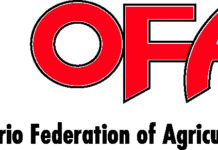by Chris Turnbull
The TransCanada Pipeline, or Energy East, if approved, would be 4600 km of pipeline transporting diluted bitumen from Alberta to a marine terminal in New Brunswick. Some of the pipeline is new, but a significant amount of it is natural gas pipeline converted to transport diluted bitumen. The pipeline would cross the Rideau River at Baxter Conservation Area and carry the bitumen through North Grenville and over our Oxford and Nepean aquifers, classified as “Highly Vulnerable to Contamination” by province officials. The pipeline’s main function is to get oil to market — across the country to New Brunswick, and from there to the States, for further export. In 2013, TransCanada started a process that included applying to the National Energy Board, Canada’s regulatory body for energy infrastructure projects, held open houses along the route of the pipeline, and solicited support from officials and citizens.
For those of us in North Grenville, and surrounding municipalities, the pipeline is a threat to our drinking water. If there were a leak in the pipeline anywhere close to North Grenville, there would be serious consequences for our community. 70% of North Grenville residents rely on more shallow Oxford aquifer. Even a small leak would have extremely serious consequences because the aquifer is recharged from surface groundwater.
Consider 1.1 million barrels a day, under pressure, flowing through that pipe. While TransCanada has repeatedly offered assurances that their leak-detection system will enable them to stop a leak by shutting off a valve to that pipe, the minimum estimated time for shut off is just over 20 minutes. In that time, 2.6 million litres of diluted bitumen could leak out. This does not include the amount of bitumen already present in the pipe. An independent assessment of the leak detection technology, using realistic leak scenarios, noted that the leak-detection system is not consistent, especially at detecting leaks of less than 1.5% of daily volume. If this is the case, then the leak of diluted bitumen could be undetected for a long period of time.
Between 2013 and 2015, Sustainable North Grenville asked Council several times to conduct an independent risk assessment of the potential impacts on our drinking water, air, and land, as well as associated risks on the Rideau River system. Consistently, Council expressed that TransCanada would give them adequate information regarding risks and declined to conduct an independent study.
Only after Sustainable North Grenville presented Council with a signed petition from residents that expressed their concerns about the Energy East pipeline, did the Muncipality pass a Resolution, adopting a neutral position until “TransCanada clearly demonstrates to the residents of this community that the Energy East Pipeline Project will meet the highest available technical standards when it comes to public safety and environmental protection and will implement, without reservation, cutting-edge contingency planning and emergency response programs.”
In early spring 2015, there was an update on the Energy East Project at the Committee of the Whole. According to committee minutes, a staff member reported that North Grenville had received a guarantee from TransCanada that they would provide potable water if our drinking water sources became contaminated. Updates were provided for protecting the aquifers, TransCanada’s steps and measures and potential cleanup plans, and it was noted that impact would be minimal. Planner Forbes Symon noted that better than industry standards would be needed for these aquifers because they are quite different from one another, which suggests that better than industry standards had not been provided.
Sustainable North Grenville also asked the Municipality to apply for Intervenor status with the National Energy Board, which the Municipality did in spring 2015. In its application, the Muncipality states that of primary concern is the protection of both aquifers before and after construction of the pipeline. Also of concern was that the directional bore under the Rideau would intersect both aquifers. Despite numerous discussions with Energy East, Council remained unsatisfied that the construction methods and engineering solutions were sufficient to guarantee the long term protection of the aquifers. The directional bore tunnel was not sufficiently sealed/grouted and could allow for bitumen to exit in the event of a leak. There was additonal concern regarding seismic activity and TransCanada’s response to such events in terms of inspection of the pipeline.
Our Muncipality was granted Intervenor status, but there has been no public meeting or further information given to residents, publicly, since the Resolution that informs residents of North Grenville of any evidence that Energy East may have presented to Council, or evidence that Council might have independently gathered regarding whether pipeline safety standards are above industry standards and whether Council and residents concerns regarding pipeline risks have been addressed.
In early September, 2016, at a United Counties of Leeds and Grenville meeting, a motion was passed to sign a letter of support for the TransCanada pipeline for September 22nd. In support of this motion was Municipality of North Grenville Mayor, David Gordon, despite the Municipality’s Intervenor status and Council’s prior Resolution. The Mayor of Merrickville abstained from voting, preferring instead to receive public input. Merrickville’s Council is holding a public meeting this week to answer concerns and discuss the pipeline.
What does it mean for Mayor Gordon, as the Municipality of North Grenville’s representative on the United Counties of Leeds and Grenville Council, to sign a motion of support of the Energy East Pipeline when his own municipality has claimed a “neutral” position and received Intervenor status based on non-confidence in TransCanada’s engineering solutions and TransCanada’s ability to respond adequately in the event of an emergency? Is a major risk to our aquifers acceptable? Can the Municipality offer solid evidence to residents that the concerns have been addressed?






